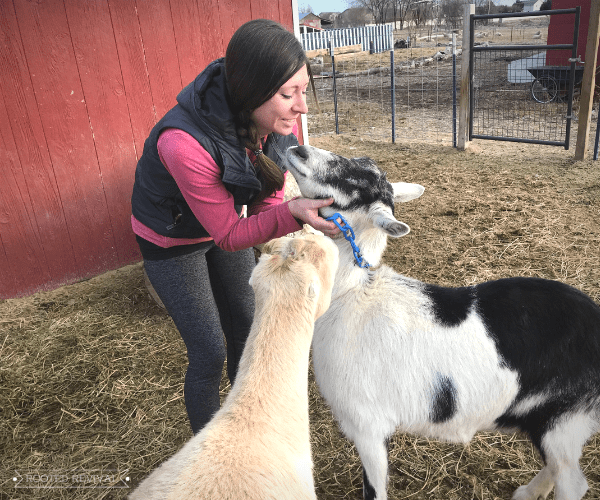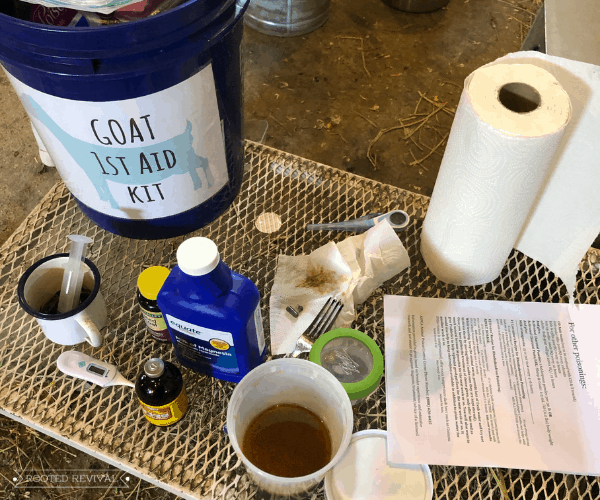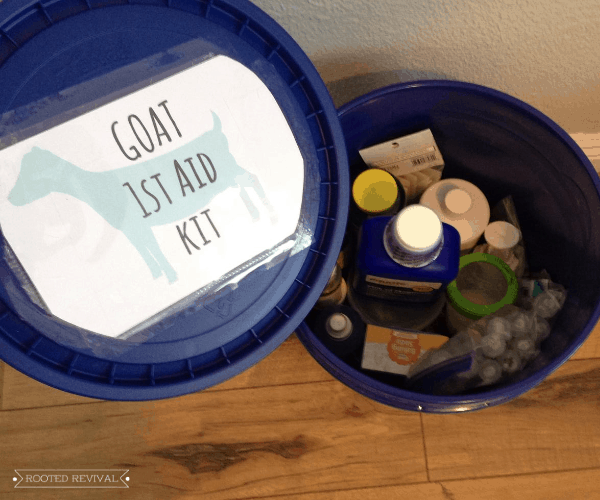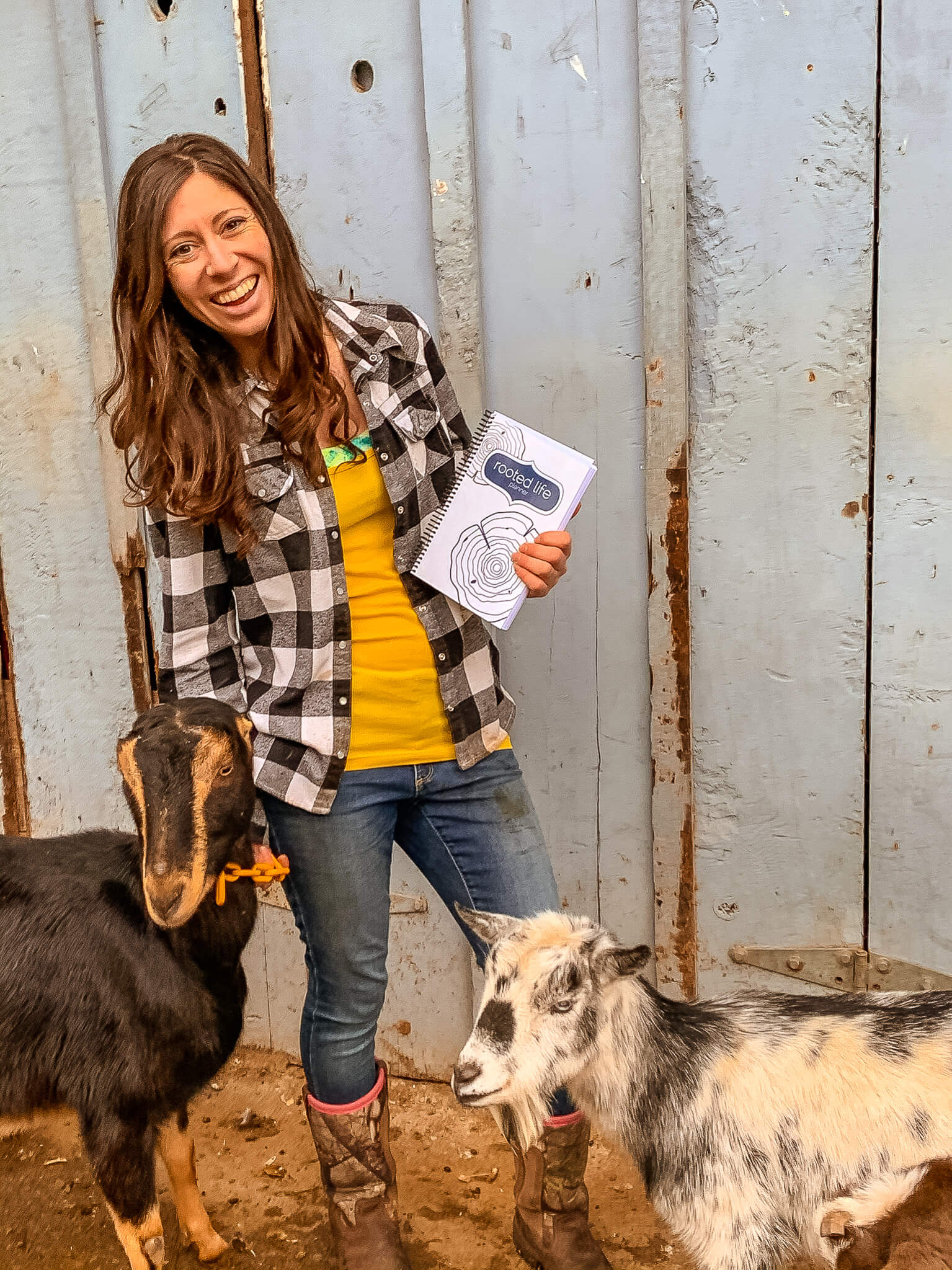Stocking a goat first aid kit will help you be more prepared for an emergency, illness or injury. Here’s what we keep in our goat first aid kit!
A couple weeks ago, I posted about the wonderful new method that we discovered to store our (non-refrigerated) animal first aid supplies using 5-gallon buckets. Seriously, it’s such a game changer! Be sure to pop on over and read why!
After my post about our first aid kits, I received a lot of questions from people who wanted to know exactly what we kept on hand in each our first aid kits. So today, I’m sharing exactly what I keep on hand in our goat first aid kit. You can also check out what we keep in our chicken first aid kit and out goat kidding kit!
** I may receive a commission at no additional cost to you from purchases made through links in this article. Full Disclosure Link **
Before your stock your goat first aid kit…
Let me preface this by saying that I am in no way a veterinary expert nor will my first aid kits ever be “complete”. Our first aid kits are rather fluid because I constantly change my mind based on new research and techniques, or I will find products that work better for our animals.
I would also caution people about keeping products on hand that they don’t know how to use or don’t feel comfortable using. This is especially true regarding antibiotic and wormers which animals can easily develop resistance to… but that’s another topic for another time.
Basically: it’s okay to keep things on hand that you aren’t experienced with, BUT please consult someone who is very knowledgeable before administering. Administering without a plan or full understanding of side-effects, long-term repercussions or how a product works is never a good idea.
Bottom Line:
You don’t have to be an expert to own animals.
What you do need to do is to be committed to educating yourself and willing to constantly continue learning.
Nothing makes you more humble about your knowledge than a sick animal! The more you learn, the more you realize how very little you actually know!
Surprisingly, a lot of vets are also in the dark about how to treat goats! I would be very hesitant to blindly trust a vet without ensuring that they have studied and understand the complicated physiology and treatment of goats. This is why it is vital to have a knowledgeable goat mentor!
All that being said, preparing for an emergency before it happens is always, always a smart thing to do! Do your research, reach out to as many knowledgeable professionals in the field as you can, and start getting prepared!
Also, I have to warn you that I am in no way prescribing or diagnosing! Again, I am not an expert! This is purely informational content to share with you what we keep on hand, so please don’t sue me.
Now that that’s out of the way….
Let’s talk about what I keep in our goat first aid kit!
It takes a while to build up your kit and you will learn as you go! In order to stay organized, I keep an on-going list of my supplies on my Medical Supply Inventory List in my Animal Management Binder (get your free copy).
Here are the primary items I am currently keeping on hand:
Where to Buy Supplies for your Goat Kidding Kit:
Buying your kidding supplies ahead of time will help ensure that you have everything on hand when you need it! Here are my favorite places to buy supplies:
Target or Walmart: Some of the basic supplies like thermometers, gloves and scissors can be purchased at a super store like Walmart or Target.
Local Feed Store: Depending on your feed store, they may or may not carry a good assortment of medical supplies. I’ve generally found that smaller local feed stores carry more medical supplies than chain stores like Tractor Supply. However, even at a good feed store, quantities and varieties of products can be really limited. For instance, goat supplies are limited at my local feed stores. But, feed stores are a great place to get some basics like needles and syringes.
Amazon: Obviously, you can buy pretty much anything on Amazon! It can be a great place to shop for items that you can’t always find locally. Plus you don’t have to spend your whole day driving around to different stores. I’ve included links for several of the products below.
Online Vet Supply Store: Online pet and veterinary supply stores are ideal for those hard to find items like blood tubes, specialty supplements and even vaccinations. My favorite online supply stores are Jeffers and Valley Vet.
Basic First Aid Supplies for Your Goat First Aid Kit:
- Thermometers (I keep 2-3 on hand because you can never find them when you need them!)
- Disposable gloves
- Scissors
- Needles (22 g, 20 g & 18 g)
- Syringes (3 cc, 6 cc, 10 cc, 20 cc)
- Red top tubes: use for blood collection for mail-in tests like CAE & CL (Buy it here
)
- Vet Wrap (Buy it here
)
- Maxi pads (I prefer these over gauze pads because they are easy to use and very absorbent)
- Triple Antibiotic Ointment
- Vetricyn Spray (Buy it here
)
- Providone Iodine Scrub or Betadine or Chlorhexidine Scrub (Buy it here
) (FYI: I don’t think any of these are technically FDA approved for food-producing animals so be aware there may be withdrawal times if you are butchering or milking for commercial use or resale)
- 7% Iodine Solution or spray (Buy it here
)
- Antibiotic eye ointment
- Green Goo, Animal Formula (Buy it here
): one of my favorites for wound and tissue care
- Drench Gun and Tubing: 1 – 1 1/2 inch works well for adult goats (Buy it here
)
- Weight Tape (Buy it here
)
- Scalpels (Buy it here
)
- Blood stop powder, yarrow leaf or cornstarch
- Children’s liquid Benadryl
- Mastitis Test Strips, if milking (Buy it here
)
- Heat lamp, heat pad or other heat source (for warming a chilled goat)
- Notepad & pen
- Headlamp or flashlight
- Vet and goat mentor’s phone numbers
- Printed quick reference dosage charts (I have included some links below to helpful dosage charts/listings that you can print out. Again, always consult your vet and/or goat mentor before dosing!)
- https://fiascofarm.com/goats/
medications.htm - http://www.goatworld.com/
health/meds/dosages.shtml - Goat Emergency Team Facebook Page (has very helpful admins and quick reference charts in their files)
- https://fiascofarm.com/goats/
Antitoxins that are ideal to have on hand:
- CD Antitoxin
- Tetanus Antitoxin
Note: These antitoxins are not the same as the CD&T vaccine – vaccines are labeled as “toxoids”, so be sure you order the correct ones. Toxoids (vaccines) are given preventative once a year. Antitoxins are given if/when an issue arises as an additional boost for their system and may be the key to saving your animal if they go down with suspected tetanus or enterotoxemia (over-eating disease). I order both of these from Jeffer’s Supply. They are not cheap and you will need to pay for overnight shipping so they stay cool. However, the price is very justifiable compared to losing an animal in such a painful manner.
Rumen Health Supplies:
- Probios paste, the bovine formula (Buy it here
)
- Cheap stethoscope: for listening to rumen sounds
- Pepto-Bismal and/or Milk of Magnesia
- Bloat Release (Buy it here
)
- Dark Beer (we don’t keep this on hand, but we live close to a 24 hour Walmart in case we ever need it)
- Baking Soda
- Angel Maker (I haven’t personally used this yet, but have heard only good things about it and plan on getting it soon – you can purchase it at animalhealthsolutionsinc.com)
Vitamin, Minerals & Supplements
- Vitamin C paste
- BoSe, selenium gel or Replamin Gel: Especially if your area is selenium-deficient. BoSe is prescription only. Replamin is our favorite to give on a regular basis because it also contains chelated minerals. (Buy it here
)
- Vet Rx: there is a goat & sheep formulation, but they are all basically the same and you can use the basic poultry formulation on goats (Buy it here
)
- B Complex, fortified (Buy it here
)
- Activated charcoal (Buy it here
)
- Red Cell or iron supplement (Buy it here
)
- Nutridrench, goat and sheep formula (Buy it here
)
- Black Strap Molasses, Organic if possible (Buy it here
)
- Honey
- Cayenne
- Cinnamon
- Thiamine (Rx only)
Over the Counter Drugs:
- Aspirin or Ibuprofen: Anti-inflammatory, pain relief. These are both poorly absorbed by ruminant animals, so large doses are needed (buy the big bottle!) but they are good to have on hand.
- LA 200 or BioMycin 200: For pink eye, chlamydia and mycoplasma, mastitis and certain other illnesses. These are similar drugs (both are oxytetracyclines). However, BioMycin is the no-sting version and is much less painful to administer, but either one will work in a pinch!
- Pen G: Used for respiratory illnesses, do not use at the same time as an oxytetracycline
- Note: With these drugs, always do your research first and be aware of how to administer, dosage, side-effects and contraindications. Be especially careful if you are treating a pregnant, young or lactating goat! Most drugs are considered off-label or extra-label usage in goats and a vet should be consulted before use – be aware that this can effect milk withdrawals and may even effect the ability to sell your milk, based on your state regulations. Again, talk to a knowledgeable goat breeder/mentor or a vet that has studied and understands goats.
Prescription (Or Order Online):
- Banamine: Anti-inflammatory drug – should only be used under vet guidance, but can be purchased at racehorsemeds.com
- Baytril: Broad-spectrum antibiotic – should only be used under vet guidance, but can be purchased at racehorsemeds.com
- Dexamethasone: Corticosteriod used to reduce pain and inflammation – should only be used under vet guidance, but can be purchased at racehorsemeds.com
Note: With these drugs, always do your research first and be aware of how to administer, dosage, side-effects and contraindications. Be especially careful if you are treating a pregnant, young or lactating goat! Most drugs are considered off-label or extra-label usage in goats and a vet should be consulted before use – be aware that this can effect milk withdrawals and may even effect the ability to sell your milk, based on your state regulations. Again, talk to a knowledgeable goat breeder/mentor or a vet that has studied and understands goats.
Prescription Only Drugs:
- LRS (lactated ringers solution): Use subcutaneously to treat dehydration
- Epinephrine: Keep on hand for anaphylactic reactions when giving injections
- Thiamine: A B-vitamin that is used to treat polio
- Note: Finding the right vet and establishing a good relationship with them is vital! Some vets, once you have established a relationship, will allow you to order these supplies and other items to have on hand for emergency situations. However, the prescription items are intended only to be used under the guidance of the vet.
Coccidiosis Prevention and Treatment:
- Toltrazuril 5% suspension (Baycox): used for coccidiosis treatment – may be more effective than Corid and only requires one dose but not approved for goats – can be purchased at racehorsemeds.com
- Amprolium (Corid): extra-label treatment for goats
- Decoquinate (Deccox): preventative approved for goats
- Note: I hesitated to put these meds on the list, because they are off-label and there is always a lot of debate about how to treat/prevent coccidiosis. There is no right or perfect way to prevent or treat it. Currently, we do not use a preventative program for our kids, and have been lucky. But that may change in the future. I wouldn’t hesitate to treat if one of them starts exhibiting signs of coccidiosis. Talk to your vet as these are extra-label drugs. Learn more about Coccidiosis here.
So there you have it! If you have most of these supplies on hand, you will be prepared to handle most things that come your way! Again, knowledge is just as important as supplies, so continue educating yourself on how to keep your herd healthy and how to handle emergency situations.
My first aid kit is constantly changing as new products and information becomes available. I will try to keep this list updated and make notes as things change over the years. *last updated: July 2020
What do you keep on hand in your goat first aid kits? Share in the comments below so that we can all help each other be stocked and ready for an emergency.










Kathy
Wednesday 23rd of August 2023
We've been raising Nubians for 30 years and have added Guernsey Goats who we love. We're mentoring a new 4-H group, found this website and will recommend it as a resource! Thanks!
Tia
Thursday 8th of June 2023
I signed up but it still hasn't send me a welcome email. I've even checked spam and everything. what do I do?
Stephanie
Monday 15th of June 2020
I can't lie. I came here mostly to say "lamanchas!" because I saw them on pinterest. I love our lamanchas, and they're the only breed I ever want to keep. And in the process of getting (probably too) excited about the best goats ever, I learned I need to stock up on a few things I was missing. Thanks for this post!
Project Zenstead
Tuesday 16th of June 2020
Lamanchas are the BEST!!! They are all we have now too! We started with some mini Lamanchas and Nigerians and then just went full Lamancha. And we will never go back! :D Glad to hear that you agree!